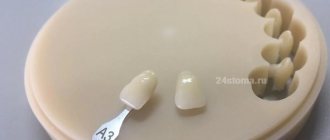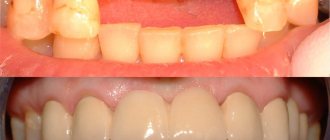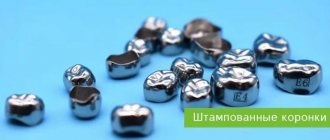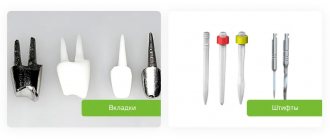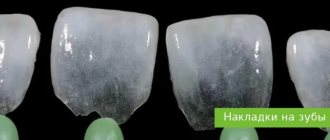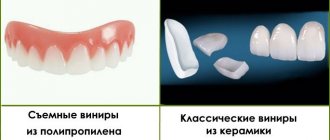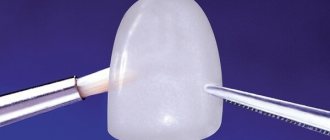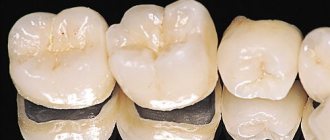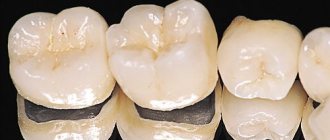Everyone will tell you that dental treatment, especially when it comes to prosthetics and surgical restoration of the functions and aesthetics of the dentition, is a rather expensive procedure. Therefore, we are all the more pleased to offer you an effective, but at the same time inexpensive technique - plastic crowns.
Their price is significantly lower than the cost of metal-ceramic and metal systems. At the same time, they provide good quality, durability, long service life and comfort.
Dental crowns made of plastic are a good compromise between efficiency and price in cases where there is a need to save money.
Plastic dental crowns: pros and cons
The fact that plastic as a material is much more vulnerable than metal, zirconium and ceramic alloys is an obvious and long-known fact. But this does not mean that crowns made from it cannot be relied upon. Their impeccable service life is at least 3-5 years. Moreover, in the first years, in terms of their aesthetic qualities, they will not be inferior to much more expensive analogues. In addition, unlike metal and ceramic, plastic crowns require much less time to produce. Taking an impression, making a mold and fitting - all this can be done in one visit to our clinic.
Interestingly, despite all the limited characteristics of plastic crowns, they have their own unique scope of application. What is usually regarded as a disadvantage in some circumstances turns into a virtue in others. In multi-stage prosthetics, it is plastic crowns that are installed for the initial stage. They can literally be made in minutes, install quickly, last as long as they're supposed to, and provide good function and good looks.
Temporary plastic crowns are an indispensable weapon for dentists in treatments that require a long period of production of bridges or dentures, as well as in cases of delayed implantation.
Temporary crowns on teeth allow you to lead a normal lifestyle, practically without limiting yourself in anything, while the aesthetics and functions of the teeth will be completely preserved when using this technique.
Types of dental plastic crowns
Depending on the types of prosthetics, there are two groups of crowns:
- Temporary plastic structures are placed for several months until the dental implant takes root, treatment continues and a permanent prosthetic structure is made. During this time, the crown will protect the implant from mechanical damage, withstand the load, and the aesthetic characteristics of the tooth will not be affected;
- permanent plastic dental crowns are placed extremely rarely, they are considered a “relic of the past”, but are relevant for people with a very limited budget. The crown design has a metal base and a plastic coating.
It is important! According to the recommendations of dentists, it is better to replace permanent plastic crowns every one to two years.
Based on the area where crowns are installed, there are:
- plastic crowns for the front teeth;
- plastic crowns for chewing teeth.
There is no fundamental difference between these designs, but crowns for chewing teeth wear out faster. After a period of 4–5 years, the crown is removed, the metal frame remains, and the plastic coating is applied again.
Indications and contraindications for the installation of plastic crowns
Indications for use
1 use case
In orthopedic dentistry, plastic crowns are used as temporary prosthetic structures. Temporary plastic crowns reliably protect prepared abutment teeth or eliminate defects in the dentition during the laboratory stage of prosthetics (that is, during the period when a permanent prosthesis or implant is manufactured in a dental laboratory). Thanks to plastic prosthetic structures, the aesthetic and chewing functions of the jaw apparatus do not suffer even in cases where the treatment process is delayed for months and years. Due to the low price of temporary plastic dentures, dentists are able to significantly reduce the overall cost of medical services.
Use case 2
In some cases, plastic crowns are also used as permanent ones.
In particular, such prosthetic structures are used for:
- restoration of the shape, color and functions of the front teeth;
- with pathological changes in their hard tissues,
- injuries,
- depulpation,
- anomalies of position and appearance.
Contraindications
Contraindications to the installation of plastic crowns are:
- childhood;
- allergy to components included in plastic;
- deep bite;
- tendency to bruxism.
Advantages and disadvantages of dental plastic crowns – expert opinions of doctors
The advantages of plastic construction include the following points:
- the simplest restoration of tooth function;
- relatively low price for “new teeth”;
- aesthetics of the product, because installing such a crown is always better than leaving a gap in the cavity;
- the ability to choose the required crown based on the shade and shape of the tooth;
- they are quickly produced (even in front of the patient).
The nuances of using temporary plastic crowns include:
- short service life - from several months to a year;
- fragility of the material, especially when taking solid products;
- crowns are not as transparent as ceramic ones;
- Over time, such artificial teeth darken and absorb pigments, because plastic has a porous texture;
- over time, a gap forms between the lined part and the frame, where bacteria accumulate;
- The plastic material wears out quickly;
- the edges of the crown may put pressure on the gums, and additional soft tissue treatment may be necessary;
- abutment teeth can be pre-ground;
- plastic can cause allergies.
Disadvantages and advantages of plastic crowns
Disadvantages of crowns
The main disadvantages of plastic crowns are:
- fragility (plastic dentures can last about 2 years, while ceramic and metal crowns can last at least 10 years);
- the ability of the porous structure of plastic to absorb odors and dyes;
- gradual cracking of the walls of the crown and the formation of chips on its surface;
- the presence in plastic of substances that can provoke the development of allergic reactions;
- low hygienic qualities (pores in plastic are an excellent “shelter” for the reproduction and growth of pathogenic microorganisms);
- the need for pronounced grinding of the supporting teeth (only plastic crowns with much thicker walls than prostheses made of metal or ceramic can maintain sufficient strength);
- high risk of mechanical injury to gum tissue from the edges of plastic crowns.
Advantages of crowns
In turn, the advantages of plastic crowns include:
- comparative simplicity and high speed of production, no need to use complex equipment;
- excellent aesthetic qualities, absence of unnatural shine characteristic of metal crowns;
- low cost (the price of plastic prostheses can be tens of times lower than for metal or ceramic prosthetic structures).
Despite the huge number of disadvantages of plastic, prostheses made on its basis are actively used for orthopedic treatment of dental pathologies.
How is a dental plastic crown structure made?
1. Direct – making a new tooth by a dentist while the patient is directly in the chair. The process takes about forty minutes and 1 visit to the dentist.
Manufacturing proceeds as follows:
- the dentist takes an impression of the tooth;
- the resulting impression is filled with viscous plastic material;
- the necessary impression is placed on the tooth;
- after the composite material has hardened, the crown is ready, the impression is removed, and the finished tooth remains in its place;
- The dentist grinds the crown into the cavity and “adjusts” it to the individual parameters of the jaw for comfortable biting.
2. The indirect method of making a plastic crown for a tooth will require 2 visits to the dentist.
The structure is created like this:
- At the first visit, the doctor takes an impression of the tooth;
- then the cast falls into the hands of a technician, who in the laboratory makes a crown made of plastic material, individual in shape and shade;
- The required crown is fixed by the doctor using special dental cement.
It is important! Making a crown using the indirect method is a longer process. Consequently, the service costs an order of magnitude higher than producing a tooth using the direct method. But with the indirect technique, the crown turns out to be more aesthetic in shape and color of the material, as well as reliable in terms of functionality. The production time for a temporary tooth crown in the laboratory is about a week.
There are also so-called standard (standard shape, ready-made) crowns that do not require preliminary manufacturing in the laboratory. But when using such products, there is no guarantee that the new tooth will fit perfectly and that the plastic structure will stand reliably throughout the required service life.
Note! Plastic crowns for temporary use are made directly (in the patient’s mouth), but structures for permanent wear are made in a technical laboratory. If ready-made crowns are used, i.e. there is no manufacturing process, they are already supplied to dentistry in sets (graded for certain groups of teeth).
Advantages of plastic crowns
- Low cost compared to other materials
- Fast production and installation time (such a crown is made practically in the patient’s mouth and is installed literally in one day)
- Protects the prepared tooth from negative influences
- Allows the tooth to function normally and participate in the process of chewing food (although it is better to exclude solid foods from the diet)
- Preserves the beauty of your smile (the crown looks like a real tooth)
When choosing one type of crown or another, everyone takes into account their financial capabilities, as well as the functional purpose of the prosthesis. If you need a permanent structure, it is better to choose more durable materials, but if it is temporary, then plastic dental crowns But, like all types of prostheses, they also have their drawbacks.
How to properly care for plastic crowns? Doctors' recommendations for care
Preventive visits to the dentist's office are necessary - at least once every six months.
Care involves daily brushing of teeth, using dental floss and an irrigator, since pathological bacteria accumulate between the gum and crown, as well as the base and coating of the crown.
A certain diet is also recommended: exclude foods with a high content of dyes, remove solid foods from the diet in order to avoid mechanical injuries to the teeth.
It is important! If you see that there is brown plaque between the gum and the crown, be sure to contact your dentist for treatment. Dark spots are a sign of the accumulation of plaque, bacteria that negatively affect the condition of the gums and other teeth. It may be necessary to make a new crown to replace the old one.
How to install plastic crowns
Before proceeding with the installation of a crown, the Minsk dentist must grind the tooth, remove the pulp if necessary, strengthen the tooth with a pin and make an impression. Only after all procedures can you begin installation. An impression with liquid plastic is placed on the teeth, and after the material hardens, the crown is ground and polished so that it does not cause discomfort to patients and looks like a real tooth. The plastic crown must be secured with special cement. Usually all procedures are carried out within an hour. At the Medical Center for Family Dentistry, you will be able to perform all the necessary procedures not only efficiently, but also comfortably, and thanks to drug sedation, treatment can be carried out even in your sleep and without pain.
Quite often plastic crowns are installed temporarily, while a permanent prosthesis is being made from porcelain or metal-ceramics, or to hide defects on temporary teeth. In any case, when making this type of crown, the doctor carefully selects the color of the structure so that it does not differ from the rest of the teeth.
Cost of a plastic crown
The final cost of making a plastic crown depends on the following factors:
- type of material;
- method of manufacturing the structure;
- appointment of the necessary crown (temporary or permanent);
- condition of the oral cavity and the need for treatment;
- features of the teeth that provide support for the crown;
- qualifications of the serving dentist;
- clinic pricing policy.
The cost of a simple temporary plastic crown per tooth is up to 1000 rubles. If it is made by a technician, the cost can reach 2,500 rubles per tooth. The manufacture of a permanent plastic structure will cost the patient 4,500 rubles per unit.
At Zuub dentistry you will be offered the best prices for plastic crowns. Make an initial appointment with a dentist to find out the cost of manufacturing the required crown in the laboratory and turnkey plastic prosthetic services.
Price for plastic crowns
Low cost of the material itself, simplicity and speed of production, versatility - these are the clear advantages of plastic crowns. Their low price allows you to save on full-fledged orthodontic treatment, and get results literally in one doctor’s visit. If you have any questions or would like to know more about what is included in the cost of placing plastic crowns, please call any of our branches and schedule a free initial consultation.
How to buy acrylic teeth?
You can purchase plastic teeth, the price of which varies depending on the manufacturer and the number of units in the set, taking into account the needs of a particular institution: ready-made sets include 28 teeth, and it is also possible to purchase a set of chewing teeth.
The assortment of our online store allows us to comprehensively equip a dental laboratory and ensure the availability of any teeth, taking into account the needs of patients. Dentlman.ru offers products at pleasantly low prices, and orders are delivered within a short time. We accept any payment methods - cash and bank transfer, payment by plastic card or electronic money.
Properties and advantages of artificial teeth
Acrylic teeth meet all the requirements for the method of removable prosthetics and are characterized by the following properties:
- High degree of strength and abrasion resistance
- High color stability, which allows you to maintain the selected shade and makes the prosthesis invisible to others
- Aesthetic qualities – full correspondence of appearance to natural healthy teeth
- Anatomical occlusal surface of the posterior teeth – eliminates the need for complex adjustments
- Resistance to chemical influences and aggressive environments
The main advantages of working with them include: - Ease of use
- Optimal chemical adhesion to ensure ease of attachment and prevent breakage and the need for replacement when wearing a prosthesis
- Possibility of selective filing of teeth, which makes it possible to maximally adapt the prosthesis to the parameters of the patient’s dental system
- Price – acrylic teeth are comparatively cheaper than their analogues
Thus, temporary plastic teeth can be used in most cases where the situation requires removable or partial dentures.
